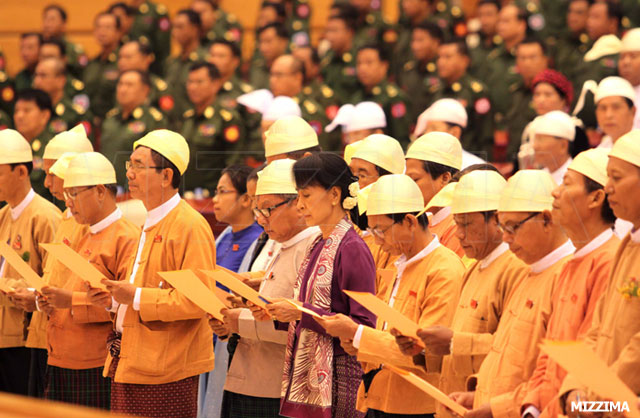Aung San Suu Kyi took the Burmese Parliament’s oath of office on Wednesday, marking another step in her amazing journey from political detainee to the most prominent member of Burma’s newly formed lawmaking body.
 Suu Kyi put aside her party’s opposition to the wording of the oath of office, which required NLD members to swear to “safeguard” the Constitution, a document she has pledged to try to change, saying it is not democratic.
Suu Kyi put aside her party’s opposition to the wording of the oath of office, which required NLD members to swear to “safeguard” the Constitution, a document she has pledged to try to change, saying it is not democratic.
The decision to side-step the oath issue was welcomed by other political parties, avoiding a nasty confrontation even before all 43 National League for Democracy members-elect had been sworn in.
Suu Kyi was accompanied into Parliament by a wide range of NLD members-elect including seasoned lawmakers, a rapper entertainer and first-time politicians, with a healthy contingent of women.
Suu Kyi told reporters after taking the oath that she had no qualms about sitting next to Burmese military members, but she said she would like to see the country's legislative body become more democratic.
“We would like our Parliament to be in line with genuine democratic values. It's not because we want to remove anybody, as such. We just want to make the kind of improvements that would make our national assembly truly democratic,” the BBC quoted her saying.
Parliament member Win Oo of the ruling, military-backed Union Solidarity and Development Party (USDP) praised her decision to drop her parliamentary boycott.
“The fact that Suu Kyi has come to the Parliament is good, because as we have said so many times, if we want to achieve things for the benefit of the people and the country we should let sleeping dogs lie,” he said.
The question now is how will her NLD party translate its phenomenal success to real influence within a body where it has less than 7 per cent representation, and the combined democratic opposition accounts for around 20 per cent of Parliament, which continues to be dominated by the USDOP and government-appointed military representatives?
Nevertheless, years of oppressive military rule clearly receded even more on Wednesday, as Suu Kyi’s two-decade struggle against a military regime faded away into a struggle within a quasi-democratic Parliament.
Suu Kyi’s key ally in her party’s dramatic transformation has been Burmese President Thein Sein, with whom she has formed what she calls an “understanding” that they will both work for the Burmese people. Thein Sein has unveiled a continuous series of democratic reforms over the past year, surprising western government which have responded by suspending or removing many sanctions.
The NLD swept the by-elections on April 1, after a campaign that Suu Kyi said was not democratic. The next Parliamentary election is in 2015.
In dropping her opposition to the oath issue, Suu Kyi stressed that her party will not drop its pledge to work to amend the Constitution. When she was walking into the Parliament building in Naypyitaw, she was asked is it was an important day for Burma. "I think only time will tell,” she said.
Suu Kyi wore white roses in her hair as she stood with several dozen of her party's lawmakers while the speaker of the Lower House asked them to read the oath of office.
The NLD has too few seats to wield any real power in the ruling party-dominated assembly, and there are fears the presence of an token opposition could simply legitimize the current regime.
However, others say a new course has been set, and the future will look more similar to the give-and-take within all democratic systems, no matter that Burma’s political system is still nascent and fragile.


